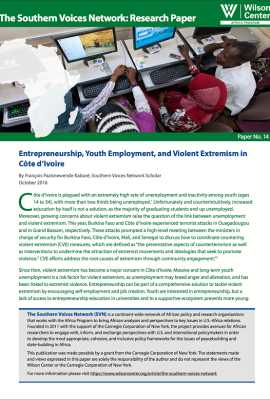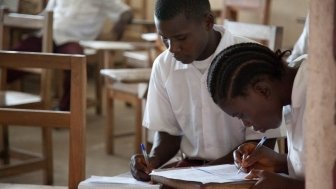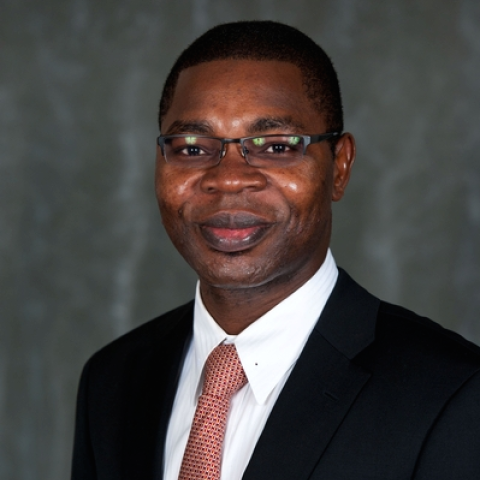François Pazisnewende Kaboré
Southern Voices Network Scholar
Professional Affiliation
Director, Jesuit University Institute at the Center for Research and Action for Peace
Expert Bio
Dr. Kaboré is the Director of the Jesuit University Institute at the Center for Research and Action for Peace (CERAP/IDDH) and Manager of the MBA program in entrepreneurship of the same institute in Adibjan (Côte d’Ivoire). In addition to his administrative duties, Dr. Kaboré keeps teaching commitments in economics, statistics, governance, and knowledge economics. From 2012 to 2014, Dr Kaboré was visiting research professor at the School of Foreign Service (SFS) of Georgetown University where he taught undergraduate and graduate courses (Economic Analysis of Sub-Saharan Africa, Statistics, Econometrics, and Science, Technology, and Development). He has also taught and lectured in the following institutions: American University, Sophia University in Japan, the Center for Economic Catch Up at Seoul National University, and the Catholic University of Central Africa in Yaoundé, Cameroon. The professional experience of Dr. Kaboré includes consultancy at the World Bank's Sustainable Development Network (Washington, D.C.), at the World Intellectual Property Organization (WIPO) in Geneva.
Dr. Kaboré’s area of research is innovation, technology transfer, intellectual property rights (IPR), and development. He has published book chapters and articles in various academic journals such as Sciences et Techniques, Revue Suisse de Recherche Scientifique, La Civilta Catolica, etc. Dr Kaboré holds two B.A. (Philosophy and Math-Economics), an M.A. in Economics, two graduate certificates (theology and teaching), and a Ph.D. in Economics. Dr. Kaboré is currently working to set up a regional business school in West Africa.
He is a Southern Voices Network Scholar at the Wilson Center.
Wilson Center Project
Education, Entrepreneurship, and Youth Employment in Ivory Coast
Project Summary
According to its 2015 Global Youth Employment Trend, the International Labor Office (ILO) estimates that the incidence of long-term unemployment among youth in Sub-Saharan Africa was 48.1 percent. In 2015, an estimated 226 million youth lived in Africa. Countries such as Côte d’Ivoire are no exception, as tertiary-educated students are two to three times more likely to be unemployed than the non-educated youth. The first part of this research studies the impact of entrepreneurship training on youth employment in Côte d’Ivoire. This first part of the research uses econometrics methods to study survey data conducted in 2015 on student entrepreneurial intent in Abidjan, Côte d’Ivoire.
The second part of this research investigates qualitatively how entrepreneurship education could be mainstreamed in higher education curricular in Abidjan, Côte d’Ivoire. Given the cost of targeted programs, they cannot actually reach a sizable number of youth. Mainstreaming entrepreneurship education, on the other hand, will be cost effective and help reach a critical mass of youth to sustain peace and prosperity.
Major Publications
« Intellectual Property Rights, Brain Drain and Innovation in Africa », in Fink and Miguelez (ed.) 2016. Intellectual Property Rights, the Migration of Skilled Workers and Development, Oxford University Press, (Forthcoming).
« Recherche et “Technological Catch-Up » en Afrique: Le Rôle de l’Etat », Revue des Sciences Sociales du PASRES (Programme D’Appui Stratégique à la Recherche Scientifique) mars 2016.
“Burkina Faso: Croissance Economique Certaine, Développement Humain à Construire. Au cœur de l’Afrique Occidentale : la « Patrie des Hommes Intègres » in Rigobert Minani (dir) 2015. Les Facteurs Majeurs et Causes de l’Instabilité en Afrique. Série : Questions Controversées. Ed. CERAP. Pp15-45
« Corsa all’Africa. Gli interessi di Stati Unidi, Cina ed Europa », La Civilta Cattolica 3967 (2015), IV pp.54-58
« Intellectual Property Rights, Innovation and Public Private Partnership in Africa », Spécial hors série n° 1, Mai 2014, Science et technique, Lettres, Sciences sociales et humaines, pp.213-231
Insight & Analysis by François Pazisnewende Kaboré
Filter
- Publication
- Conflict Resolution and Peacebuilding
Fostering Entrepreneurship and Building Peace Among Youth in Côte d’Ivoire and Beyond

- Past event
- Education
Wilson Council Briefing: Education, Entrepreneurship, and Employment in Africa

- Video
- Education
Youth Employment & Entrepreneurship Education in Africa

- Past event
- Education
Education, Entrepreneurship, and Youth Employment in Côte d’Ivoire and Beyond


